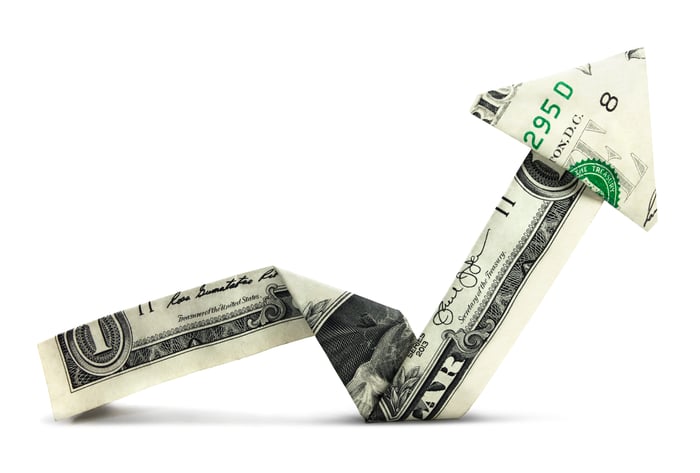Investing in growth stocks can feel like a roller-coaster ride. For instance, at the beginning of the year, Ionis Pharmaceuticals (IONS 0.21%) was trading at $52 a share. By April, the stock was up to $86 a share. And now it's back down to $59. That's a fair amount of volatility! Individual stocks can and do move up and down, sometimes as much as 10% (or more) in a day -- but it's probably a bad idea to follow the market so closely. As long as the company's numbers continue to rise and impress, its stock price will do the same. So let's take a look at what's important at Ionis.

source: Getty Images
One of the largest pipelines in biotech
Suppose you are the owner of a mid-sized biotech company, valued at less than $10 billion. How many drugs would you imagine are in your pipeline? Maybe three or four, if the drugs are billion-dollar candidates. So it's kind of shocking to see how many drugs Ionis Pharma has in development: three in the marketplace, and 26 molecules in the pipeline.
The market is valuing Ionis at $8.4 billion right now. Let's compare Ionis to Celgene (CELG) and Vertex Pharmaceuticals (VRTX 0.17%).
| Company | Drugs in Pipeline | Market Cap |
| Ionis Pharma | 26 | $8.4 billion |
| Celgene | 19 | $70 billion |
| Vertex Pharma | 7 | $43 billion |
So what's up with that? Ionis has the same number of drugs in development as Celgene and Vertex put together. If we add the latter two companies' market caps together, we'd expect Ionis to have a mighty market cap of $113 billion. And yet the market is valuing it at just $8.4 billion. Why is this company so cheap right now?
One possibility is that the market is overlooking the pipeline. Perhaps these companies are instead being valued based on revenue, earnings, and success in the marketplace. So let's check those numbers.
| Company | Drugs in Market | Revenue |
| Ionis Pharma | 3 | $600 million |
| Celgene | 7 | $15.2 billion |
| Vertex Pharma | 3 | $3 billion |
OK, so it appears much of these companies' value comes from their drugs that are already treating patients. Vertex and Celgene have higher valuations because their approved drugs are much more valuable than what Ionis has in the marketplace so far. Vertex is making big money on its cystic fibrosis platform, and Celgene has very valuable cancer drugs.
Ultimately, of course, the stock market values what happens in the future, not what happened in the past. A biotech can surprise and upset the status quo when one of its drugs hits the market. And Ionis is taking 26 shots at that goal. Ionis has cystic fibrosis drugs in its pipeline, and cancer drugs, too. So what happens to the respective stock prices of these companies if and when all these molecules start to bear fruit?

Source: Getty Images
The other thing to consider about Ionis is that it has signed quite a number of collaborative deals with big pharma and other biotechs, including GlaxoSmithKline (GSK 0.75%), Roche (RHHBY 0.70%), AstraZeneca (AZN 0.54%), Bayer (BAYR.Y 1.71%), Novartis (NVS -1.25%), Biogen (BIIB 3.48%), and Dynacure.
Perhaps the market is discounting the massive number of drugs Ionis has in development because so many of these drugs are shared properties now. Ionis does have five drugs that it is keeping in-house. And four drugs are being developed by Akcea Therapeutics (AKCA), a former subsidiary that is controlled by Ionis. But 17 of its molecules in the pipeline are subject to various collaborative agreements. So the future revenue at Ionis is not as large as it might appear at first glance.
On the other hand, under this system, many of the costs of drug development are being shuffled off to other players. Indeed, we might see the sheer number of development deals as a validation of the science. Big pharma is paying through the nose to get access to Ionis's knowledge of RNA targets and drug development.
Dollars today and dollars tomorrow
Ionis has a profit margin of 50%, and revenue is growing at 39% year over year. That is a Rule of 40 score of 89, which is outstanding. Of course, this rule was originally devised for SaaS (software-as-a-service) companies, not biotechs. Nonetheless, I believe it can be informative in evaluating companies outside the software arena.
Ionis has outstanding profit margins and revenue growth. And the company has a huge platform, which gives it many opportunities to dramatically increase its valuation. Over the next 10 to 20 years, we should see a market capitalization that is a lot closer to $113 billion than the current $8.4 billion. Investors can look forward to a healthy future for Ionis.




